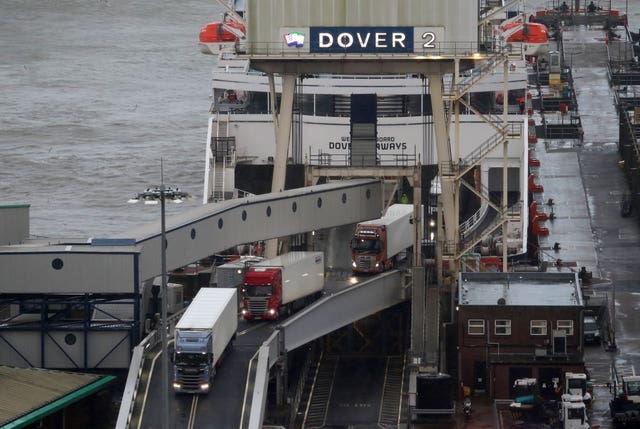
Matt Frei 10am - 12pm
8 January 2021, 21:04

It comes as some companies have already paused exports into Europe, including Ireland, due to Brexit red tape.
A senior Government minister has warned businesses and hauliers that there is likely to be “significant additional disruption” at the UK border as a result of Brexit customs changes in the coming weeks.
Cabinet Office minister Michael Gove said efforts to assist would be “redoubled” as traders were urged to ensure their paperwork was in order, with cargo traffic at Dover expected to reach pre-Christmas levels again next week.
It comes as major parcel courier DPD paused some delivery services into Europe – including Ireland – because of pressure caused by new post-Brexit red tape.
Marks & Spencer also revealed that its popular Percy Pigs sweets were struggling to find their way across the Irish Sea to supermarket shelves in Ireland.
The retailer said the new rules and regulations are set to “significantly impact” its overseas ventures in Ireland, the Czech Republic and France.
Mr Gove told broadcasters on Friday: “So far disruption at the border hasn’t been too profound but it is the case that in the weeks ahead we expect that there will be significant additional disruption, particularly on the Dover-Calais route.
“It is our responsibility in Government to make sure that business is as ready as possible, and hauliers and traders have already done a lot but we have to redouble our efforts to communicate the precise paperwork that is required in order to make sure that trade can flow freely.
“So over the course of the next few days, Government will be stepping up that communications effort to make sure that business knows what is required.”
The latest Government figures show that around 700 lorries have been turned away from the border since new rules came in to force after the end of the transition period with the European Union on January 1.
About 150 fines have been handed out for non-compliance with new rules designed to reduce truck queues in Kent.
But officials said those numbers could increase as the flow of lorries heading through Kent increases, with traffic drastically reduced at present.
Over the past week, there has been an average of 1,584 lorries per day attempting border crossings, which is only around 40% of historical norms, according to the Cabinet Office.
As well as requiring the correct paperwork, including export declarations and the extra certificates needed for products such as plant and animal products, hauliers must secure a negative Covid-19 test and a Kent Access Permit before embarking on their travels onwards to Europe.

The increased push by Government to ready businesses comes as a host of sectors complained about the added complexity that they were having to wade through to trade with Europe.
Seafood exporters said they have been hit by a “perfect storm” of bureaucracy, IT problems and confusion following Brexit.
Tesco said there had been a “short delay on certain products” entering Northern Ireland.
And hauliers described being “overwhelmed” by red tape due to new checks on deliveries to Northern Ireland from the rest of the UK.
DPD said that up to 20% of parcels had incorrect or incomplete data, meaning they had to be returned to customers, and announced a pause to its road service into Europe and Ireland until Wednesday.
New rules for business with Europe are here.
Use the Brexit checker tool to get personalised actions to keep your business moving 👉 https://t.co/SqnSzKKMzh pic.twitter.com/7jeN702Nav
— Cabinet Office (@cabinetofficeuk) January 8, 2021
Haulier industry body Logistics UK said deliveries were being delayed as lorries arrived in Belfast with incomplete paperwork.
In order to avoid a hard border with the Republic, Boris Johnson agreed Northern Ireland would remain in the EU single market – but that has meant checks on goods arriving from Great Britain.
Irish customs authorities said they would temporarily relax regulations around goods moving from Great Britain.
Labour accused the Government of failing to properly prepare for the end of the transition period.
Rachel Reeves, shadow chancellor of the Duchy of Lancaster, said: “This Government said it was prepared for a smooth transition – but instead major carriers like DPD are left wrangling with completely overwhelmed systems without any help.
“As well as consumers, this impacts on British companies large to small – from carriers like DPD to the many small, independent businesses already under such huge strain trying to sell across Europe.”
A Government spokesman said: “Although many businesses have moved goods successfully since January 1, we are aware of some issues, and are providing guidance and support.”